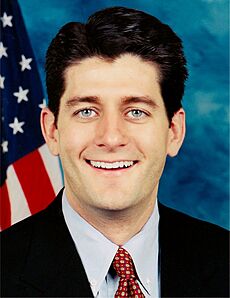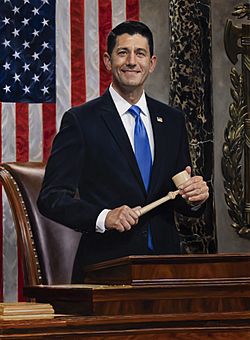Paul Ryan facts for kids
Quick facts for kids
Paul Ryan
|
|||||||||||||||||||||||||||||||||
|---|---|---|---|---|---|---|---|---|---|---|---|---|---|---|---|---|---|---|---|---|---|---|---|---|---|---|---|---|---|---|---|---|---|
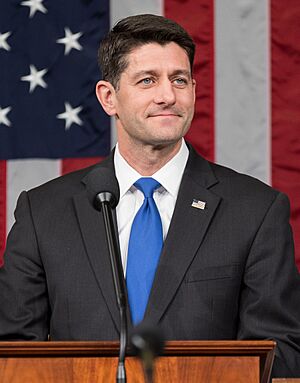
Official portrait, 2017
|
|||||||||||||||||||||||||||||||||
| 54th Speaker of the United States House of Representatives | |||||||||||||||||||||||||||||||||
| In office October 29, 2015 – January 3, 2019 |
|||||||||||||||||||||||||||||||||
| Preceded by | John Boehner | ||||||||||||||||||||||||||||||||
| Succeeded by | Nancy Pelosi | ||||||||||||||||||||||||||||||||
|
|||||||||||||||||||||||||||||||||
| Member of the U.S. House of Representatives from Wisconsin's 1st district |
|||||||||||||||||||||||||||||||||
| In office January 3, 1999 – January 3, 2019 |
|||||||||||||||||||||||||||||||||
| Preceded by | Mark Neumann | ||||||||||||||||||||||||||||||||
| Succeeded by | Bryan Steil | ||||||||||||||||||||||||||||||||
| Personal details | |||||||||||||||||||||||||||||||||
| Born |
Paul Davis Ryan
January 29, 1970 Janesville, Wisconsin, U.S. |
||||||||||||||||||||||||||||||||
| Political party | Republican | ||||||||||||||||||||||||||||||||
| Spouse |
Janna Little
(m. 2000) |
||||||||||||||||||||||||||||||||
| Children | 3 | ||||||||||||||||||||||||||||||||
| Education | Miami University (BA) | ||||||||||||||||||||||||||||||||
| Awards | |||||||||||||||||||||||||||||||||
| Signature | |||||||||||||||||||||||||||||||||
Paul Davis Ryan (born January 29, 1970) is an American politician who was the 54th Speaker of the United States House of Representatives from 2015 to 2019. As a member of the Republican Party, he represented his home state of Wisconsin in Congress for 20 years.
In 2012, Ryan was the Republican nominee for Vice President of the United States. He ran with presidential candidate Mitt Romney. They lost the election to President Barack Obama and Vice President Joe Biden.
Ryan grew up in Janesville, Wisconsin. After graduating from Miami University in Ohio, he worked in Washington, D.C. for several years. In 1998, he was elected to the U.S. House of Representatives. During his time in Congress, he became known for his focus on the national budget and economic issues.
As Speaker of the House, Ryan helped pass the Tax Cuts and Jobs Act of 2017. He chose not to run for re-election in 2018 and left Congress in January 2019.
Contents
Early Life and Schooling
Paul Davis Ryan was born in Janesville, Wisconsin, on January 29, 1970. He was the youngest of four children. His family has lived in Wisconsin for five generations. His great-grandfather started a construction company in 1884 that is still run by his relatives today.
Ryan went to Catholic school and later Joseph A. Craig High School. In high school, he was president of his junior class, which made him prom king. He also played on the ski, track, and soccer teams.
When Ryan was 16, his father died from a heart attack. After this, his grandmother, who had Alzheimer's disease, moved in with his family, and Ryan helped care for her. He received Social Security survivor benefits, which he saved to pay for college.
Ryan earned a degree in economics and political science from Miami University in Ohio. In college, he became very interested in the ideas of economists like Friedrich Hayek and Milton Friedman. He also worked as an intern for Wisconsin Senator Bob Kasten in Washington, D.C.
Start of His Political Career
After graduating from college in 1992, Ryan worked as an aide for Senator Kasten. When Kasten lost his re-election, Ryan became a speechwriter for a conservative group called Empower America.
He later worked as a speechwriter for Jack Kemp, who was the Republican candidate for vice president in the 1996 United States presidential election. Ryan saw Kemp as a mentor who had a big influence on him. In 1997, he moved back to Wisconsin for a short time to work for his family's construction company.
A Career in Congress
Getting Elected
In 1998, at age 28, Ryan ran for a seat in the U.S. House of Representatives and won. He became one of the youngest members of Congress at the time. He represented Wisconsin's 1st congressional district for 20 years, from 1999 to 2019. He was re-elected eight times, always with strong support from voters in his district.
Work in the House
During his time in Congress, Ryan focused on budget and economic issues. In 2011, he became the chairman of the House Budget Committee. This position gave him a powerful platform to share his ideas about how the government should spend money.
Ryan was known as a "deficit hawk," meaning he was very concerned about the national debt. He created budget plans, like "The Path to Prosperity," that suggested major changes to government programs like Medicare and Medicaid. His ideas were often at the center of political debates in Washington.
Before becoming Speaker, Ryan also served as chairman of the powerful House Ways and Means Committee, which handles taxes, trade, and social programs.
2012 Vice Presidential Campaign
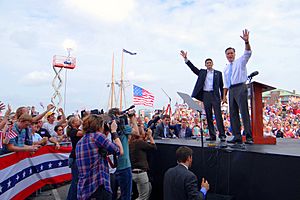
In August 2012, Republican presidential candidate Mitt Romney chose Paul Ryan to be his running mate for vice president. Ryan was the first person from Wisconsin to run on a major party's national ticket.
During the campaign, Ryan and Romney promised to create millions of new jobs and to repeal the Patient Protection and Affordable Care Act (often called Obamacare). Ryan debated Vice President Joe Biden in the only vice presidential debate of the election.
In November 2012, Romney and Ryan lost the election to President Barack Obama and Vice President Joe Biden. Even though he lost the vice presidency, Ryan won his re-election to his seat in Congress.
Speaker of the House
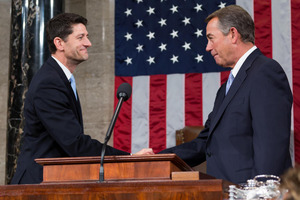
Becoming Speaker
In September 2015, Speaker of the House John Boehner announced he was resigning. After the top candidate to replace him dropped out, many Republicans urged Ryan to run. At first, Ryan said he did not want the job, but he later agreed to run if he could unite the different groups within the Republican party.
On October 29, 2015, the House of Representatives elected Paul Ryan as the 54th Speaker. At 45 years old, he was the youngest person to hold the job in nearly 150 years. As Speaker, he became the leader of the Republicans in the House.
Working with President Trump
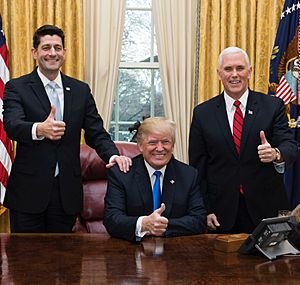
After Donald Trump won the 2016 presidential election, Ryan had to lead the House while working with the new president. They had a friendly but sometimes uneasy relationship. They agreed on many policies but sometimes disagreed on other issues.
Ryan's biggest legislative achievement as Speaker was the Tax Cuts and Jobs Act of 2017. This law made major changes to the U.S. tax system for both individuals and businesses. He also helped pass a law that rolled back some of the banking regulations put in place after the 2008 financial crisis.
Another major goal for Ryan and House Republicans was to repeal and replace the Affordable Care Act. They passed a bill called the American Health Care Act of 2017 (AHCA), but it did not pass in the Senate.
Retirement from Congress
On April 11, 2018, Ryan announced that he would not run for re-election. He said he wanted to spend more time with his family after serving 20 years in Congress. He finished his term as Speaker in January 2019, and Nancy Pelosi was elected to replace him after the Democratic Party won control of the House in the 2018 elections.
Life After Congress
After leaving Congress, Paul Ryan has stayed involved in public life. In March 2019, he joined the board of directors of Fox Corporation. He has also joined the faculty at the University of Notre Dame as a guest lecturer in political science and economics.
In 2019, he started a non-profit organization called the American Idea Foundation. He has also joined a private equity firm and an advisory company.
In recent years, Ryan has said that the Republican Party should move on from Donald Trump. In 2024, he stated he would not vote for Trump in the presidential election.
Personal Life
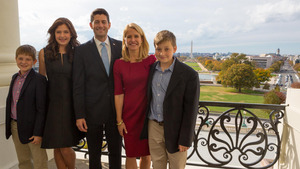
In 2000, Ryan married Janna Little, a tax attorney. They live in Janesville, Wisconsin, and have three children: Liza, Charles, and Sam.
Ryan is known for being a fitness enthusiast. He is a fan of the P90X workout program, which involves a mix of different exercises. He has said that staying active is important to him, partly because his father and grandfather both died of heart attacks before the age of 60.
See also
 In Spanish: Paul Ryan para niños
In Spanish: Paul Ryan para niños
 | Misty Copeland |
 | Raven Wilkinson |
 | Debra Austin |
 | Aesha Ash |


